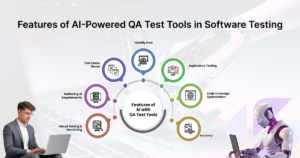The Role of AI in Testing and Quality Assurance in Software Development
Rapid advances in software development have increased the risk of testing and quality (QA) teams. With the increasing complexity of the project, shorter release times, and the demand for a flawless user experience, the need for fast and efficient testing is increasingly important Enter artificial intelligence (AI) . —a revolutionary technology that is changing the way software is tested. AI promises not only to streamline the testing process but also to improve the accuracy, coverage and overall quality of software products.
In this blog, we explore how AI is changing software testing and QA, and the benefits, real-world applications, and challenges of adopting AI-driven testing methodologies.
Understanding of traditional testing methods
Overview of manual testing
Manual testing has been the way QA teams have been for years. It involves human testers going through pre-defined tests, manually identifying bugs or problems with the software. However, manual testing has its limitations. It is labor intensive, time consuming and prone to human error, especially when working on complex or repetitive tasks.
automated testing tools
Automated testing addressed some of the challenges of manual testing by using scripts and tools to automate the test cases. This helps speed up common tasks like regression testing. While automated testing improves productivity, creating and maintaining test scripts requires human oversight. In addition, traditional automated testing struggles to adapt to dynamic or complex environments, limiting its effectiveness in today’s fast-paced environments.

What is testing with AI?*
Defining AI in testing
AI-driven testing uses artificial intelligence and machine learning to simulate human intelligence and automate complex testing tasks. Unlike traditional testing, AI can learn from previous testing cycles, analyze large amounts of data, and adapt to new testing environments without constant human intervention
Basic AI techniques used in QA
AI-powered testing tools rely on techniques such as machine learning, natural language processing (NLP), and deep learning. Machine learning helps AI tools learn from historical data, improving the accuracy of future experiments. NLP AI is capable of understanding and translating test scripts into human language, making it easier to automate UI and functional testing.
Differences from traditional tests
Aabased testing is more flexible and intelligent compared to traditional methods. It can adapt to changes in the codebase, look for patterns, and even predict bugs. This allows for faster test cycles, fewer errors and higher quality results without the extensive maintenance required for traditional automated testing
Benefits of AI in software testing and QA
Increased production efficiency
AI dramatically reduces the time needed for testing by automating repetitive tasks, improving the accuracy of tests, and speeding up the entire testing process This allows for faster releases without losing its quality.
Improved accuracy and precision
Some errors may be overlooked by human testers due to fatigue or supervision. AI, on the other hand, can detect even subtle details, reducing the risk of missed errors and providing more accurate test results.
Increased testing fees
AI can analyze large amounts of data and generate large amounts of test cases, ensuring proper test coverage. This allows QA teams to test different packages and combinations of issues that would be too time consuming for manual or traditional automated testing.
Ability to self-learn
AI-powered testing tools can learn from past test results, improving future test cycles. This self-learning capability allows the AI to modify and optimize testing strategies based on existing results.
Predictive research
AI’s ability to analyze historical data and trends allows it to pinpoint where errors in software may occur. This approach helps prevent major issues, and improves overall application stability.
Real-world case studies using AI in testing
AI for functional testing
Functional testing ensures that the software behaves as expected. AI can run these tests automatically, learning from previous test runs and revising the testing process. It can identify code changes and automatically optimize test cases, reducing the need for frequent updates.
AI for performance testing
AI-powered performance testing tools can simulate thousands of virtual users and analyze system response under different loads. They can predict performance bottlenecks and suggest optimizations to improve application speed and scalability.
AI in security testing
AI can improve security testing by automatically identifying potential vulnerabilities. It can map cyberattacks, predict exploitable vulnerabilities, and analyze patterns in historical security breaches to prevent future attacks.
AI for predictive maintenance
AI can sift through large amounts of data to identify patterns of potential system failure. It uses this data for predictive maintenance, ensuring that bugs and deficiencies are identified and fixed before they affect the end user.
Testing and optimizing AI tools
Popular AI testing tools
Several AI-powered testing tools are already making waves in the industry:
Testim:It uses machine learning to stabilize test cases, and automatically optimize changes to the codebase.
Applitools: Uses AI to perform visual testing, finding UI anomalies on browsers and devices.
Functionize: Uses AI for test design, execution, and maintenance, making the entire testing process smarter and more efficient.
How do these tools work
These tools use AI algorithms to analyze patterns in the application, predict potential issues, and optimize test scripts to adapt to changes. For example, Testim uses AI to automatically update test scripts as the UI changes, reducing manual processing.
Challenges and limitations of AI in experimentation
Increased initial setup costs
While AI-powered tools offer long-term benefits, they come at a high initial cost. Companies need to invest in technology and train their teams to effectively use AI-powered testing tools.
Complexity and advanced learning
Testing using AI requires skilled professionals who understand both the testing process and the AI technology. This steep learning curve can slow down initial implementation.
Over-reliance on AI
Despite its many benefits, relying solely on AI for testing can be risky. Some aspects of software quality such as usability and user experience still require human judgment. Over-reliance on AI can lead to missing information that only human intuition can analyze.
data quality and bias
AI is only as good as the data it is trained on. If the training data is incomplete or biased, the AI algorithm may miss some errors or misinterpret the results. Ensuring the quality and accuracy of training data is crucial for effective AI testing.
The future of AI is in software testing and QA
AI and continuous testing
As demands for faster releases increase, continuous testing becomes essential. AI is ideally suited for continuous test environments, as it can independently conduct tests, analyze results and provide real-time feedback. This ensures that some information is learned early in the development cycle.
Testing with AI capabilities
The future of AI in testing involves complete test cycle management. A.I.
Collaboration between AI and human testers
AI will enhance rather than replace human testers. While AI handles repetitive and data-intensive tasks, human testers can focus on higher-level concerns such as user experience, diagnostic testing, and decision making use it in a proper manner.
AI is undoubtedly transforming the software testing and QA landscape, offering increased efficiency, better accuracy, and deeper test coverage. However, it’s important to recognize that AI is a tool that complements human efforts rather than replacing them. By combining AI-driven testing tools with human expertise, organizations can deliver high-quality software faster and with greater confidence.
Are you ready to explore AI-powered testing for your next project? Stay ahead of the curve by implementing AI-driven QA solutions and improve your software quality with smarter, faster testing. Keep up with the latest in AI and software testing by our Articles for regular updates.



